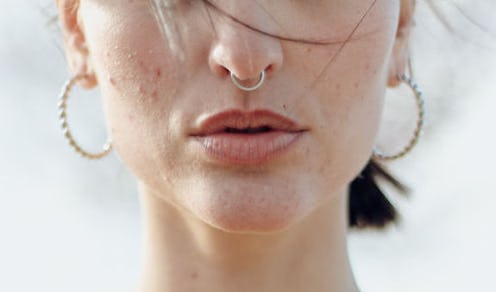
Anyone who has acne will know just how stressful the condition can be. Not only can it affect your physical appearance but also your confidence too. Whether and how to treat your acne is a personal choice — some opt to leave their skin in all its beautiful, natural glory — but if you do want to treat the condition, you may find the conflicting advice all over the internet seriously confusing. There are many differing lines of thought when it comes to treating acne, one of which is whether you should exfoliate. So, is exfoliating good for acne? I spoke to Dr Dennis Gross, founder of Dr Dennis Gross Skincare to answer the question and discover any the rules you should be following when it comes to treating the condition safely and effectively.
As GQ reports, without exfoliation dead skin cells can build up on the body which might lead to pores becoming blocked and blemishes forming. According to Vogue India, exfoliating skin aids the removal of dead skin cells, as well as helping to remove bacteria from the pores so that sebum can't build up and spots can't flourish. It also smoothes and brightens the overall condition of skin, so is an important part of a skincare routine for all. Dr Jamuna Pai, founder of SkinLabs told the publication, “Exfoliation of the dead skin cells help in brightening up your skin"
The problem is that acne-prone skin is also highly sensitive and exfoliating too harshly or too often can do more harm than good. "I’ve had patients that come in and tell me that they have bad acne and are attempting to fix it by using harsh and drying chemicals," Dr. Gross tells me. "However, this is counterintuitive; when the patient is over-exfoliating and over-drying the skin, the skin will actually produce more oil to try to balance itself, resulting in even more breakouts."
With this in mind, it's crucial to find an exfoliating formula and method that's suitable. As expert skincare brand La Roche Posay reports, it's generally acknowledged that physical exfoliants (like face scrubs) can be damaging. They create micro-tears in the skin which act as an easy entrance for bacteria and pathogens (which in turn, can lead to spots). Physical scrubs also can be gritty and harsh, sometimes resulting in more inflammation. For this reason, La Roche Posay suggest that chemical exfoliants (toners or liquids with things alpha hydroxy acids and beta hydroxy acids) can be a safer bet.
In terms of how often you should exfoliate, try using your chosen formula around three times a week to begin with, as the beauty experts at Allure suggest. Using exfoliator everyday would be overkill, but anything less than three times a week may not really have much of an effect.
I've selected an edit of some of the most gentle exfoliating formulas, from powders to liquids, which are perfect for sensitive, acne-prone skin. Keep scrolling to find your perfect product to try out.